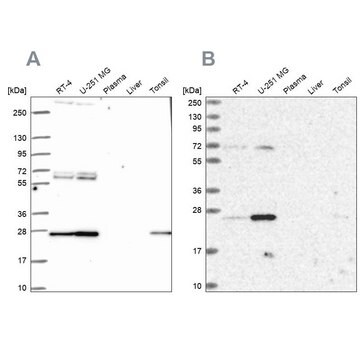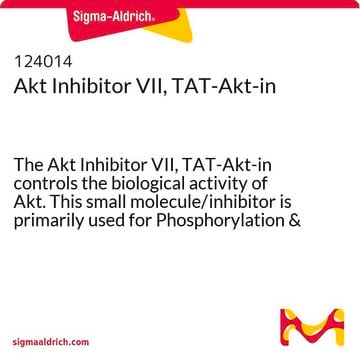124009
Akt Inhibitor III
The Akt Inhibitor III controls the biological activity of Akt. This small molecule/inhibitor is primarily used for Phosphorylation & Dephosphorylation applications.
Synonym(s):
Akt Inhibitor III, SH-6
Sign Into View Organizational & Contract Pricing
All Photos(1)
About This Item
Empirical Formula (Hill Notation):
C28H57O9P
Molecular Weight:
568.72
UNSPSC Code:
12352200
NACRES:
NA.77
Recommended Products
Quality Level
Assay
≥98% (NMR)
form
solid
manufacturer/tradename
Calbiochem®
storage condition
OK to freeze
color
white
solubility
DMSO: 10 mg/mL
shipped in
ambient
storage temp.
−20°C
General description
A cell permeable, reversible, and substrate competitive phosphatidylinositol analog that inhibits the activation of Akt and select downstream substrates without decreasing phosphorylation of PDK-1 or other kinases downstream of Ras, such as MAPK. Also acts as a potent inducer of apoptosis and selectively kills a variety of cancer cell lines that contain high levels of active Akt. When used at a concentration of 10 µM, it is reported to activate p38α/SAPK2α MAP kinase. At 10 µM it will also inhibit PKA activity.
A phosphatidylinositol analog that inhibits the activation of Akt and selected downstream substrates without affecting the phosphorylation of PDK-1 and other downstream kinases. Decreases phosphorylation of Akt without affecting the total Akt level. Reported to be a potent inducer of apoptosis and to selectively kill a variety of cancer cell lines expressing high levels of active Akt. When used at a concentration of 10 µM, it is reported to activate p38α/SAPK2α MAP kinase. At 10 µM it will also inhibit PKA activity.
Biochem/physiol Actions
Cell permeable: yes
Primary Target
Akt
Akt
Product does not compete with ATP.
Reversible: yes
Packaging
Packaged under inert gas
Warning
Toxicity: Standard Handling (A)
Reconstitution
Following reconstitution aliquot and freeze (-20°C). Stock solutions are stable for up to 3 months at -20°C.
Other Notes
Gills, J.J., et al. 2007. J. Biol. Chem.in press.
Kozikowski, A.P., et al. 2003. J. Am. Chem. Soc.125, 1144.
Kozikowski, A.P., et al. 2003. J. Am. Chem. Soc.125, 1144.
Legal Information
CALBIOCHEM is a registered trademark of Merck KGaA, Darmstadt, Germany
Storage Class Code
11 - Combustible Solids
WGK
WGK 1
Flash Point(F)
Not applicable
Flash Point(C)
Not applicable
Certificates of Analysis (COA)
Search for Certificates of Analysis (COA) by entering the products Lot/Batch Number. Lot and Batch Numbers can be found on a product’s label following the words ‘Lot’ or ‘Batch’.
Already Own This Product?
Find documentation for the products that you have recently purchased in the Document Library.
Yunpeng Shi et al.
Scientific reports, 14(1), 12427-12427 (2024-05-31)
Intracerebral hemorrhage (ICH) is a common cerebral vascular disease with high incidence, disability, and mortality. Ferroptosis is a regulated type of iron-dependent, non-apoptotic programmed cell death. There is increasing evidence that ferroptosis may lead to neuronal damage mediated by hemorrhagic
Li Li et al.
Haematologica (2021-10-08)
Platelet hyperreactivity and increased atherothrombotic risk are specifically associated with dyslipidemia. Peroxisome proliferator-activated receptor alpha (PPARα) is an important regulator of lipid metabolism. It was suggested to affect both thrombosis and hemostasis, yet the underlying mechanisms are not well understood.
Lin Liu et al.
Cell biology international, 45(2), 422-431 (2020-11-27)
Parkinson's disease (PD) is a typical neurodegenerative disease. α-Lipoic acid (α-LA) can reduce the incidence of neuropathy. The present study explored the role and mechanism of α-LA in 1-methyl-4-phenylpyridinium (MPP+ )-induced cell model of PD. The PD model was induced
Kundan Kumar et al.
iScience, 27(4), 109607-109607 (2024-04-18)
Immune evasion is critical for fungal virulence. However, how the human opportunistic pathogen Candida glabrata (Cg) accomplishes this is unknown. Here, we present the first genome-wide nucleosome map of the macrophage-internalized Cg consisting of ∼12,000 dynamic and 70,000 total nucleosomes.
Our team of scientists has experience in all areas of research including Life Science, Material Science, Chemical Synthesis, Chromatography, Analytical and many others.
Contact Technical Service







